See the full piece here.
Questions remain about online voting for youth
By Daniel Walker
The effect of online voting on youth turnout is still in doubt after an online voting trial was cancelled.
The trial was intended for the upcoming local body elections, but was canned by the government due to safety concerns.
Auckland Council’s Manager of Democracy Services, Marguerite Delbet, said she thinks the online voting trial could have increased the youth turnout by removing such hurdles as finding a postbox.
“We would’ve hoped it would’ve had some impact, but obviously I can’t quantify it,” she said.
Ms Delbet said Council could have had a better idea of what online voting does for youth, had the trial gone ahead.
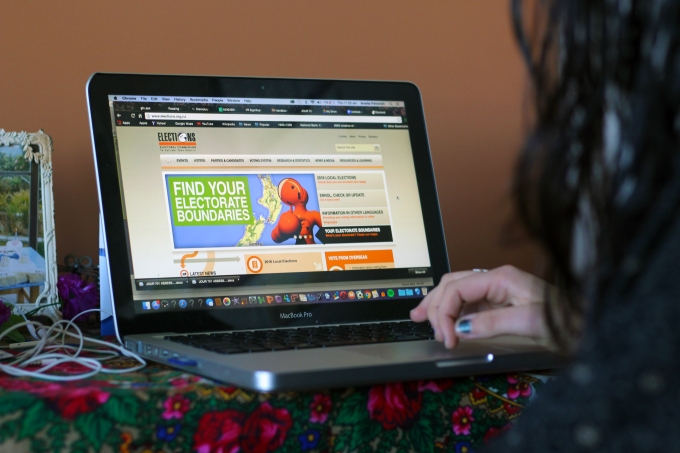
It is still unclear whether youth voter turnout would rise from online voting options. Photo: Daniel Walker
Young people currently vote at a significantly lower rate than other age groups.
Nearly two in five 18-24 year olds didn’t vote in the 2014 general election according to a Statistics NZ survey.
Members of InternetNZ were part of the Online Voting Working Party which looked at how to implement the strategy in New Zealand.
InternetNZ deputy chief executive, Andrew Cushen, said he thought that online voting would increase youth turnout, but did not have any solid evidence.
Andrew Cushen says the trial also could have helped solve some of the security concerns around online voting.
Mr Cushen said he said personally he would be more inclined to vote online.
“I’m not sure whether I’m representative, but I’d like to think that I may be, and that there could be plenty of younger New Zealanders out there that would be more likely to vote if it was online.”
One of the youth who didn’t vote in the last general election, Connor McCarty, says online voting might encourage him to vote if it was easier than the current system.
“It’s a little more difficult to vote, going out and finding a booth myself…I imagine [online voting] would target my demographic a lot more,” he said.
However Mr McCarty said his reason for not voting is not entirely that voting now is more difficult.
“There was nothing that really drew my attention to New Zealand politics, so when it came to election time, I didn’t really know who I wanted to vote for,” he said.
Mr McCarty said that if there was a shift to online voting, election candidates may put more effort into online endeavours.
“I imagine something like [online campaigns] would engage me.”
Mr Cushen said online voting could also help place emphasis on better online voter education.
“[Council elections] include that little booklet with a couple hundred words from each of the candidates – and that’s largely, I think, due to the limitations of physical space.”
“That physical space isn’t so pronounced on the online world.”
Ms Delbet said Council is running a ‘Kids Voting’ programme, which in 2013 delivered positive online voting results for 11-15 year olds.
“The feedback we get is overwhelmingly that it’s very easy,” Ms Delbet said.
This story was also published in the October 2016 print edition of Te Waha Nui.
Refugees share stories to fight stigma
By Daniel Walker
Speakers at a refugee event have asked some New Zealanders to re-consider their negative opinions of refugees and asylum seekers.
Wednesday was World Refugee Day, and Auckland University of Technology’s “Don’t fence me in” event saw speakers from a range of backgrounds talking about the issues refugees face.
AUT Centre for Refugee Education programme manager, Maria Hayward, has been involved with refugees for more than 25 years.
Ms Hayward said there are a number of reasons people may be against refugees, including concerns about letting in refugees that could be terrorists.
“Refugees are not terrorists, in the most part they’re fleeing from terrorists,” Ms Hayward said.
“The best way to avoid terrorism is to avoid marginalisation, and to welcome and value all newcomers,” she said.
Race relations commissioner, Dame Susan Devoy, said being welcoming is a part of being a New Zealander.
“If we want to avoid the kind of intolerance and hatred we are seeing across the ditch in Australia, then . . . we need to stand up for [refugees],” she said.
AUT student, Fatumatah Bah, is a former refugee whose parents escaped civil war in Sierra Leone when she was three years old.
A few days prior to the panel, Ms Bah shared a story about racial abuse she received through her life.
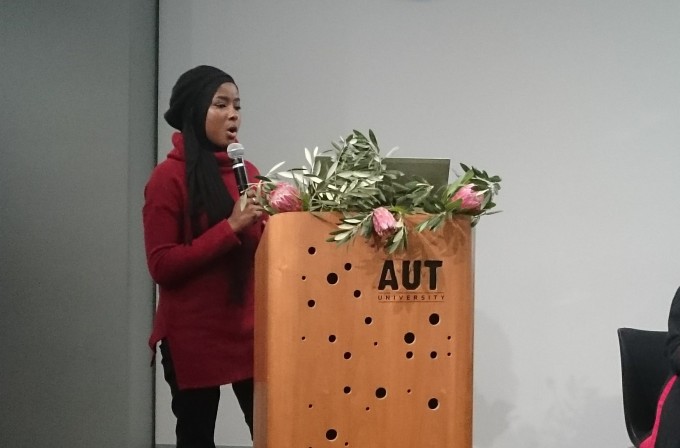
Former Sierra Leone refugee Fatumatah Bah speaks about “controlling [her] own narrative” when facing racial abuse. Photo: Daniel Walker
Ms Bah said she overcame the racial slurs and stereotypes by knowing she can choose to forge her own path.
“They can put you in a fence, they can put these labels upon you . . . but it’s a psychological fence, it’s not a physical fence,” she said.
Iranian refugee Adel Salmanzadeh is studying toward a Doctorate in Education, despite having a writing age of 13 when arriving in New Zealand at 21 years old.
Mr Salmanzadeh said when given patience and support, refugees can achieve great things.
“Look beyond their spelling and grammar mistakes . . . recognise their potential as survivors, as change-makers,” he said.
Mr Salmanzadeh said he finds strength from the label of refugee, as it is a reminder of his struggles.
“Even 30 years after becoming a refugee, I’m still proud to be called a refugee,” he said.
“The identity gives me an opportunity to talk about my people and their persecution, which continues to this day.”
VIDEO:
Fund pill for HIV, experts say
By Daniel Walker
Experts are calling for the government to fund a pill which works as a barrier for HIV.
This comes as New Zealand AIDS Foundation figures show the number of new HIV diagnoses in New Zealand has peaked.
Dr Peter Saxton, an HIV researcher at the University of Auckland said condoms alone are no longer effective enough at preventing the spread of the virus.
“What we’ve been doing has been excellent, it’s kept infection levels low, but we need new tools,” Dr Saxton said.
Dr Saxton is now calling for the government to subsidise a pill which reduces the risk of someone contracting HIV.
The pill is called Pre-Exposure Prophylaxis—more commonly known as PrEP.
Dr Saxton says PrEP has been specifically targeted at the group most at risk of HIV.
“It concentrates the drug in the anal-rectal compartment…and the mode of transmission for gay and bisexual men is by-and-large receptive anal sex,” he said.
However PrEP does not perfectly protect against HIV, or protect people from other sexually transmitted infections.
“One of the concerns is that it will result in resurgent STI epidemics,” Dr Saxton said.
Ryan Westley is an Aucklander who chooses not to use condoms when his casual sexual partners are other men.
“I hate wearing condoms during intercourse, so if there was a mechanism in place that would reduce [the risk of HIV] I’d definitely be interested,” said Mr Westley.
Mr Westley said he thought the drug should not be considered equally to condoms.
“It’s almost like the [contraceptive] pill, people who solely rely on the pill not to get pregnant are often bit in the arse,” he said.
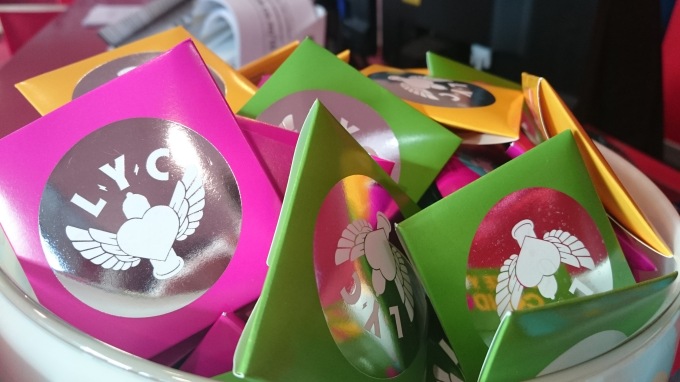
The NZ AIDS Foundation says more tools are needed to tackle HIV, but condoms are still the “backbone”. Photo: Daniel Walker
The New Zealand AIDS Foundation runs the Love Your Condom campaign, which aims to normalise condom use among gay and bisexual men.
The Foundation is also advocating for the government to fund PrEP, but spokesperson Nick Laing says condoms are still the most important HIV prevention tool.
“We want to ensure we don’t cannibalise our condoms program in any way,” Mr Laing said.
Mr Laing said if the uptake of PrEP was to result in less condom use it would not have been successful.
“It would be something that can be used in conjunction with condoms to prevent the whole suite of STIs,” he said.
Electric vehicle policies weak, critics say
By Daniel Walker
Critics of the government’s strategy to get more New Zealanders into electric vehicles are saying there are better alternatives.
The government aims for 2% of New Zealand’s light vehicle fleet to be electric by 2021.
Transport Minister, Simon Bridges, launched the programme on Thursday, outlining the steps the government would take to encourage more New Zealanders to drive electric.
These steps included extending some tax exemptions for electric vehicles, as well as allowing electric vehicles special access to bus and high occupancy lanes.
But Transportblog editor, John Polkinghorne, said the policies were underwhelming.
“I think these policies, generally speaking, look like an effort to be seen to be doing something without doing very much,” he said.
Polkinghorne said he thought the bus lane policy was one of the worst.
“We don’t want to compromise bus lanes…especially in Auckland where we’re frantically trying to roll out bus lanes, having a very underdeveloped network of them at present,” he said.
Mr Bridges said this was a problem he had considered.
“[Norway] are at a point where twenty-something percent of their fleet are electric vehicles, and they are having those issues.”
“But look, that’d be a great problem to have,” he said.

Prime Minister John Key and Transport Minister Simon Bridges took ZOE, a 100% electric vehicle, for a drive following the policy announcement. Photo: Daniel Walker
Green party transport spokesperson Julie Anne Genter criticised the policies for not introducing any new tax exemptions for electric vehicles.
Genter said the current exemptions are not enough to increase the number of electric vehicles in the country
“They don’t actually have a policy that provides a direct financial incentive for companies to buy electric vehicles,” she said.
Prime Minister John Key says further tax breaks are unnecessary, as electric vehicles are becoming cheaper over time.
“The market worldwide is growing, so the price is coming down…quite dramatically,” he said.
However Genter says climate change drastically alters the timeframe for New Zealanders to take up electric vehicles.
“We have an urgent need to respond to climate change, and so we don’t really have time to wait for the market to slowly evolve on its own.”
Polkinghorne says if the government had the environment as a primary concern, it could have introduced a carbon tax.
“There’s almost universal consensus among economists across the world that the best way to tackle greenhouse gas emissions is by taxing them,” he said.
VIDEO:
Self-defence classes get more than physical
By Daniel Walker
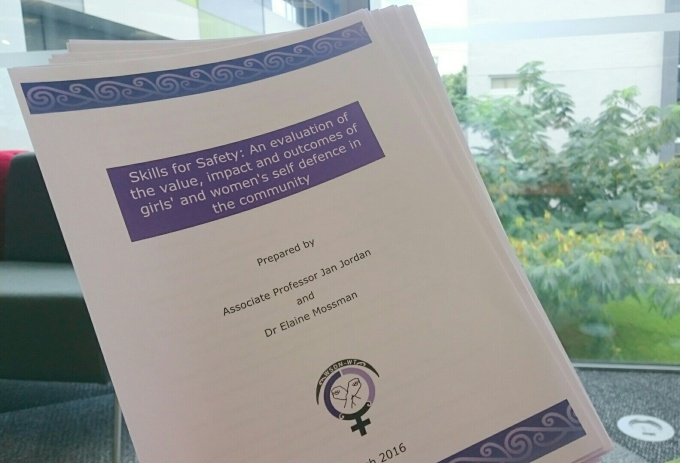
The ‘Skills for Safety’ report shows an important part of self-defence education is the promotion of awareness. Photo: Daniel Walker
A report on women’s self-defence education has showed the classes teach much more than martial arts.
The Victoria University study of the Women’s Self Defence Network Wāhine Toa heaped praise upon the classes, and recommended they receive more funding.
It found women attending the classes came away with an ability to better recognise family violence, and a higher likelihood of disclosing abuse.
Victoria Associate Professor, Jan Jordan, co-led the study, and says she was surprised at how much the classes focused on non-physical techniques.
“Even though I’d known about this group for a long time, I didn’t really realise how broad the scope was of what they were actually teaching,” says Ms Jordan.
“The [physical] techniques are short-cut effective techniques aimed at vulnerable parts rather than general martial arts—so that a lot of the course is about raising awareness,” she says.
Chairperson of the Women’s Self Defence Network, Alison Broad, is an accredited self-defence teacher herself.
Ms Broad says the classes teach women and girls how to use mind, body, and voice to keep safe.
“There’s a lot of giving clear verbal messages…from something simple like get your hand off me, to using your voice really really strongly in situations where you want to alert other people,” Ms Broad says.
Joe Tuilua is the head instructor at Self Defence 101, which is not a part of the network, but applies similar techniques.
Mr Tuilua says people are usually not equipped to emotionally deal with aggression.
“The shock of aggression which is the main thing you have to deal with before you use the self-defence,” he says.
The study concluded that the Women’s Self Defence Network needed to be better funded and resourced.
Ms Jordan says this is because classes were having such a positive impact, and showing real results.
“We were getting the message that this is somewhat of a winning formula,” Ms Jordan says.
Ms Broad says if funding was increased, they would be able to take the courses to a wider range of girls and women, and train more self-defence teachers.
Strange sounds: Tsunami alarm confusion
By Daniel Walker
Auckland’s tsunami warning alarms may be due for an overhaul after negative feedback from a test on Sunday.
Aucklanders complaining about several issues on a Civil Defence social media post, including not hearing sirens, and not receiving text or app alerts.
In response to the complaints, Civil Defence are looking at better ways of alerting the population.
Beachhaven resident, Robert Adams, says he signed up for text alerts, but did not receive one on Sunday.
Mr Adams also says he thinks the sirens are ineffective and confusing.
“They started off with short beeps, then went to a piercing long screech…how are we supposed to know what that means?” he asks.
Civil Defence Head of Emergency Management Operations, Aaron Davis, says this siren test was different to ones in the past.
Mr Davis says Civil Defence wanted to test the sirens under more realistic conditions.
“We did less education before the test of the sirens this time to see a genuine response from the communities,” he says.
Mr Davis says the response so far means Auckland tsunami sirens could change to a “voiceover tone”, where there is an explanation of the danger with the siren.
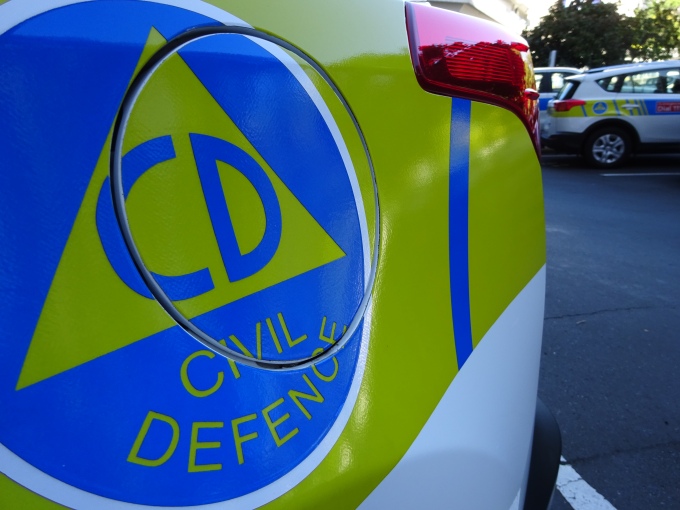
Civil Defence recieved several complaints about their tsunami siren tests on Sunday. Photo: Daniel Walker
However, there were still several complaints from residents who did not hear the sirens.
Te Atatu Peninsula resident, Lorna Allan, says she heard nothing on Sunday, when the sirens were meant to sound.
“I was at home, and I had all my doors and windows open so if it was hearable, I would’ve heard it,” she says.
Ms Allan is concerned she could be in a particularly vulnerable area if a tsunami were to strike.
“I’m on Te Atatu Peninsula, you can’t get much closer to the coast than that…it’s only two kilometres wide,” she says.
Auckland Council said in a press release that sirens should sound at Te Atatu South, and Te Atatu Peninsula North.
Mr Davis says the sirens can be affected by wind direction and weather conditions, and they are used in addition to alerts on other media.
“Sirens aren’t meant to alert one hundred percent of the population, because to do that is incredibly financially expensive,” he says.
Making good news from bad: Government increases communications spending
By Daniel Walker
Government ministries’ communication budgets increased by over $6 million in the last four years, figures show.
Labour Party state services spokesperson, Kris Faafoi, says the increase is a direct result of a government spending more on controlling its image, or ‘spin’.
“This is a government that said it would be spending less on spin, and its own numbers prove its spending six million dollars more,” Mr. Faafoi says.
The IRD and ACC departments increased their communications budgets by $2.4 million between them, significantly more than other departments.
AUT University senior journalism lecturer, Helen Sissons, says these government departments may have had their reputation damaged recently.
“They possibly thought that their public image needed some…polishing,” she says.
Minister of State Services, Paula Bennett, was not available for an interview.
Ms. Bennett told One News the increase came from more people communicating via social media and websites, and expecting up to date information.
However Ms. Sissons says the communication changes has impeded journalists trying to get information from government departments.
“I think the idea is a nice one, the reality is different; things seem to have slowed down,” she says.
The Department of Internal Affairs has the biggest bill, with over $5 million spent on communications every year since at least 2011.
Spokesperson for the Department of Internal Affairs, Sarah-Lee Crellin, says the high budget for communications is due to its high number of communication responsibilities.
One of these responsibilities is the employment of press secretaries for government Ministers.
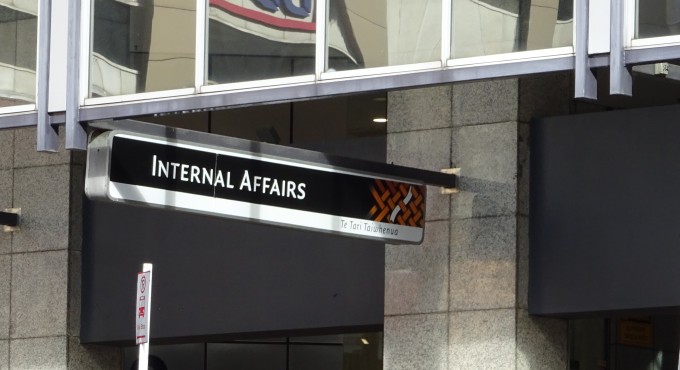
The Department of Internal Affairs is the government department with the highest spend on communications. Photo: Daniel Walker
Mr. Faafoi believes the government is spending more on these press secretaries than previously.
“This is something [the National Party] said it was hoping not to do when it came into government,” he says.
Ms. Sissons also says there has been a trend across all organisations, government and corporate, of spending more on public relations.
“The government probably employ more public relations people than any other organisation, and that would not change under Labour, I would just about guarantee it,” she says.
“It is something that we as the public need to be concerned about,” she says.
VIDEO:
Petroleum Conference loses non-industry support
By Daniel Walker
The NZ Petroleum Conference has lost all sponsors from outside the fossil fuel industry, which some claim is a result of social pressure.
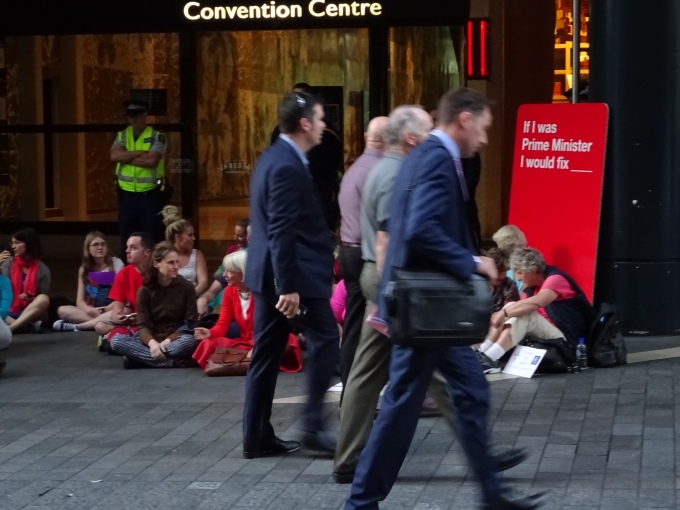
Enter a caption People head into Skycity, location of the NZ Petroleum Conference, as climate change protesters attempt to block them entrances.
ANZ, two law firms, and government agency New Zealand Trade and Enterprise have not renewed their sponsorship of the conference this year.
The remaining sponsors all have direct links to the fossil fuel industry, including energy companies and marine services.
Activist group 350 Aotearoa says associating with fossil fuels is becoming riskier for businesses.
350 Aotearoa National Co-Ordinator, Niamh O’Flynn, says protests at last year’s petroleum conference caused ANZ to pull its sponsorship, which was previously gold level.
“They were actually feeling the pressure from protest groups, from interactions we had with them last year,” she says.
AUT marketing lecturer, Sommer Kapitan, says protests in New Zealand seem to have a bigger impact than countries with higher populations.
“It seems that if you get protesters, there’s more room and more expectation that the company at least responds to the concerns,” she says.
However ANZ senior communications manager, Stefan Herrick, would not confirm the protest factored in their decision.
“We’re not sponsoring the conference this year due to changing marketing priorities,” he says.
Ms Kapitan says ANZ’s reasoning is vague, and could mean anything from simple budget cuts to a marketing strategy overhaul.
However, Ms Kapitan questions whether the situation is exactly as 350 Aotearoa claims.
“Some part of [ANZ’s] decision might have involved the protests… but many other things would’ve been on their mind as well,” she says.
Petroleum Conference manager Carla O’Neil doesn’t believe the protests were the reason ANZ dropped their sponsorship.
Ms O’Neil says none of the organisations gave reasons for dropping their sponsorship.
“They just didn’t want to be involved this year…we contacted them and obviously it’s first in, first served,” she says.
Ms Kapitan says the other companies may have seen ANZ’s decision to drop sponsorship and considered following suit.
“In that way it can be a little like a house of cards,” she says.
VIDEO:
AUT to host group opposing same sex marriage
By Daniel Walker
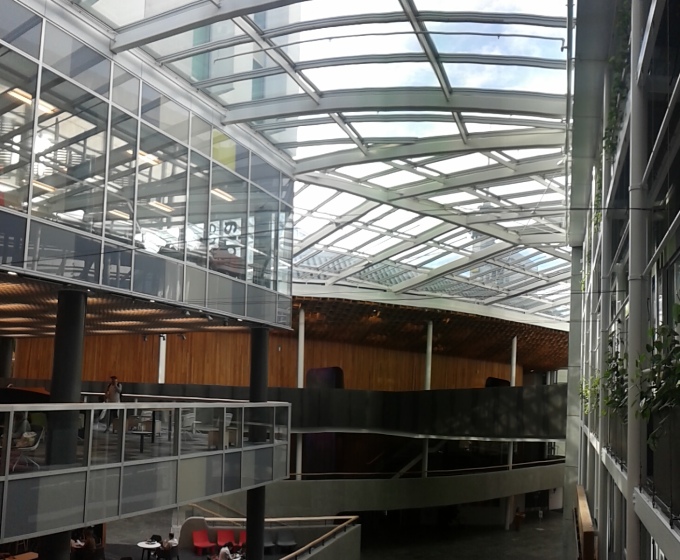
The Sir Paul Reeves Building at AUT where the FCANZ conference is to be held this weekend.
An Anglican group opposing same sex marriage is holding a conference at Auckland University of Technology this weekend.
The conference for the Fellowship of Confessing Anglicans (FCANZ) will feature discussion topics such as “True Unity” and “True Love”.
Dr Helen Jacobi, vicar of St Matthew-in-the-city says she is surprised FCANZ chose AUT, a Rainbow Tick university, to host the conference.
“[FCANZ] are working to undermine years of work in the church towards the full inclusion of people who identify as LGBTI,” Dr Jacobi says.
Alison Sykora, AUT’s Head of Communications says the university may been unaware of FCANZ’s stance on same-sex marriage before booking the conference.
Sykora says AUT will continue to host the conference.
“We don’t necessarily agree with the points of view, but we defend people’s rights to have them and express them and that’s really fundamental at a university,” Sykora says.
Sykora says AUT wouldn’t support any groups that promote hate speech, however AUT cannot guarantee the conference will be hate speech free.
Cate Thorn, volunteer chaplain at AUT says she is surprised AUT were not more aware that hosting the conference could appear to align them with FCANZ.
However Thorn emphasises the difference between protecting LGBTI rights, and denying freedom of speech.
“Can AUT be a place that has honest conversations…or does it have to be a place that only allows one voice?” Thorn asks.
Thomas James, ex-president of LGBTI group Out@AUT says he thinks AUT has made sure the conference stays separate from the university’s general population.
James says in addition, LGBTI students at AUT are organised enough that the conference is unlikely to affect them.
“We have a strong community…we know organisations like that exist, and we know how to combat that,” James says.
Hosting the FCANZ conference has not put AUT’s Rainbow Tick status at risk.
Rainbow Tick Programme Director Michael Stevens says that as a university, AUT has a duty to promote free speech.
“It’s not like AUT is suddenly changing their position on LGBTI inclusion, they’re just giving space to another group to talk,” Stevens says.
Stevens says the Rainbow Tick status mainly deals with inclusiveness in working environments, which AUT excels in.
However if similar conferences happened more frequently, Stevens says he wouldn’t be comfortable.
“We might ask for some clarification if it was to become a theme,” Stevens says.
VIDEO:
